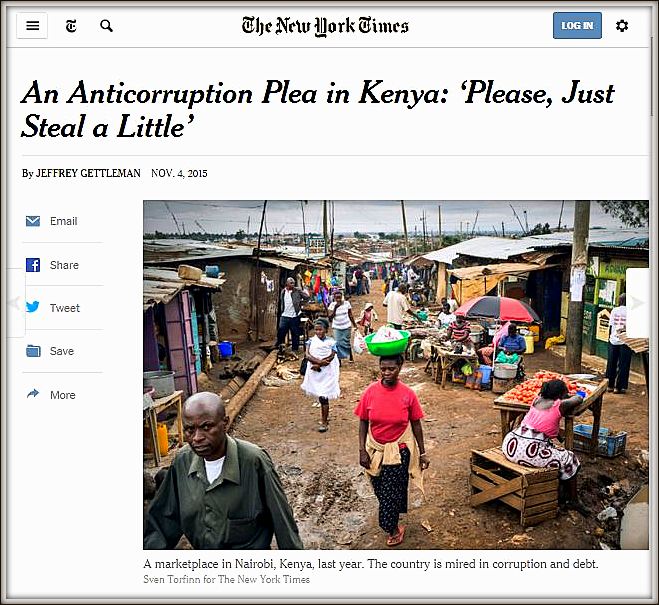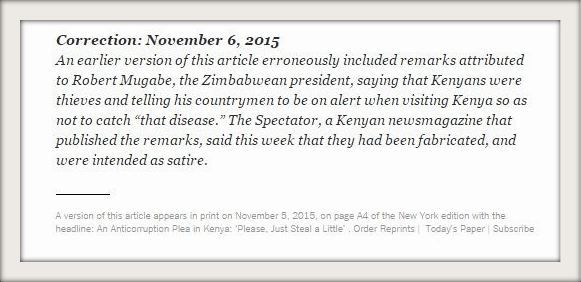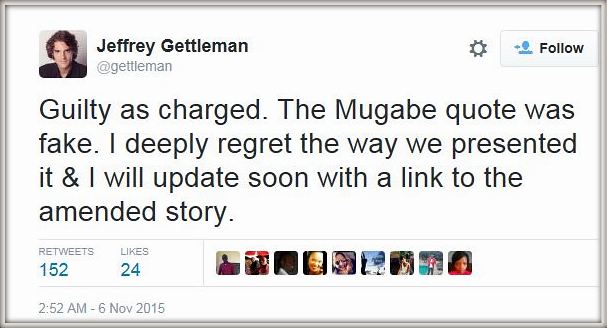Responsible journalism involves verification of information and its authenticity as well as verifying the originating source(s) prior to publication. Failure to do so is an affront to the noble profession of journalism and a credibility dent to the publishing outlet.

A fictitious article drove gullible Kenyans to engage in a misguided Twitter tirade against Zimbabwe and Zimbabweans.
Check your sources! That is the basic foundation and guiding principle behind the ethics of the profession of journalism. In publishing unverified remarks attributed to President Mugabe and picked up from an unreliable rag-tag Kenyan blog, the New York Times dismally failed in all aspects of responsible journalism. This in turn resulted in Zimbabwe and Zimbabweans being subjected to unwarranted barrages of vitriolic insults and humiliation on Twitter by Kenyans.
Great Zimbabwe Traveller is not in the habit of responding to, engaging in, or writing articles that are non-related to tourism or its related industries. This week, however, will be an exception because of strong ties between Kenya and Zimbabwe and the unfortunate situation of the past few days. While Zimbabweans are by nature a peaceful people who choose to stay above the fray and avoid frivolous confrontations, it is sad and disheartening to witness a respected fellow sister country, one with shared historical similarities and tourism, attack the other (Zimbabwe) over an obvious deliberate ploy perpetuated by a mischievous rag-tag outlet.
Events of the past few days can best be described as foolish, irrational, emotionally-charged and misguided attacks on Zimbabwe and Zimbabweans by Kenyans. This was in reaction to fabricated remarks by a discredited and unreliable Kenyan blog called The Spectator. The fake remarks attributed to President Mugabe were later picked up and republished by the New York Times in what was also perceived as a deliberate move to provoke what could have easily resulted in diplomatic tensions between the two sister countries.
The Spectator, Where It All Began
On November 3, 2015, Kenya’s rag-tag publication published fabricated remarks which they attribute to President Mugabe. They claim he labelled Kenyans as “the most arrogant thieves in the world” with “wizardry in stealing” and that their universities taught “Bachelors in Stealing” before warning Zimbabweans to be “on high alert” not to be infected by “that disease”.
The article, God Should never have created those thieves (Kenyans) here in Africa is a 2-paragraph article which is the basis and source of Kenyan attacks on Zimbabwe and Zimbabweans. While Zimbabweans were bemused by the ridiculousness of the remarks, the gullibility of Kenyans was shocking. The enclosed link allows anyone to access, read and come to their own conclusions regarding the nature of the fabricated remarks. Undoubtedly, keen followers of the Mugabe School of Thought including those familiar with the nature of his speeches and manner in which he speaks, would have easily rubbished the remarks as both fictitious and phony. Suffice to say, the intentions of the author become clear and manifest themselves in the end as they nudge Kenyans on Twitter (KOT), a community of known active cyber-bullies, to react to “Mugabe’s callously conveyed contempt” on Kenyans. The rest, as they say, is history!
The New York Times, Deliberate Instigator
What started off as a fabrication on a discredited and unreliable Kenyan satirical blog somehow found its way into a New York Times article. On November 4, 2015, Jeffrey Gettleman published An Anticorruption Plea in Kenya: ‘Please, Just Steal a Little’ – an article on endemic corruption bedeviling Kenya. Gettleman, who is also the NYT’s Bureau Chief for East Africa, deliberately inserted within the article the same fake remarks from the Spectator without proper verification and authentication. That, in itself, is akin to unprofessionalism and lazy journalism.

The original NYT article which contained fabricated remarks on President Mugabe but later retracted. Source: New York Times, November 4, 2015
Nonetheless, whatever the intention, it proved effective enough to convince even the most skeptical of Kenyans and seasoned journalists who fell for the bait. Below is the fabricated quote as it appeared in the original NYT article:
“Even Robert Mugabe, the longstanding ruler of Zimbabwe, hardly known for good governance, was quoted as saying this past weekend, “Those people of East Africa shock me with their wizardry in stealing.” He added, “You can even think that there is a subject in their universities called Bachelor of Stealing.”
Mr. Mugabe told his countrymen to be on “high alert” in case they visited Kenya. “They might infect you with that disease.” Excerpt: The New York Times, 4 November, 2015
On November 6, 2015, the New York Times retracts the above quotes after being challenged on their authenticity as well as the credibility of the source (see insert below). Both Harare and Nairobi have since dismissed the fake remarks and vehemently criticized NYT for attempting to instigate a diplomatic feud between the two countries.

Retraction statement from the NYT to the earlier inclusion of the fabricated Mugabe remarks. Source: New York Times, November 6, 2015.
#KenyansVsZimbabweans A Futile Attempt!
Without lumping all Kenyans as one, KOT, known for their notorious cyber bullying tendencies took it upon themselves to, borrowing a term from one participant, “fry Zimbabweans” by going after them full throttle using the hashtag #KenyansVsZimbabweans. True to their reputation, they took to Twitter on a vitriolic marathon to attack, ridicule and assault Zimbabwe and Zimbabweans. Needless to say, the ever vigilant Zimbabweans served the provocative Kenyan cyber bullies with a humble pie as most ignored what they had already perceived as a bait from a distance. In a way, Zimbabweans successfully poured cold water on KOT’s insatiable desire to cyber-bully through their most favoured “Twars” or International Twitter Wars. What was supposed to have been a full blown out #KenyansVsZimbabweans “Twar” ended up being nothing other than a ridiculous #KenyansVsKenyans marathon outdoing each other over a country and a people who were too busy engaged with more productive things than wasting time feeding a non-beneficial cyber-tussle of no consequence.
What our fellow Kenyan brothers and sisters need to understand about Zimbabweans is this, they are so used to this kind of vilification and misrepresentation so much so that it doesn’t phase them in any way. In typical Zimbabwean fashion, they took the high road and became the bigger person. This proved effective particularly when dealing with a country whose citizens have gained an unsavoury reputation for being the notorious cyber bully champions with a penchant for plotting, selecting and targeting their victims (often fellow African states), who are then subjected to nasty barrages of vitriolic assaults and humiliation on social media.
While not all Kenyans are guilty of this atrocious cyber bulling tendency, it nonetheless, goes without saying that the internet does not discern active from non-active participants of this otherwise unbecoming behaviour other than reflecting dominant activities within a particular country. Sadly, this has relegated Kenya to the position of notorious capital of cyber bully champions in Africa.

Unlike Zimbabweans, Kenyans are gullible and prone to manipulation by mischievous bloggers. Credit: DB Kipkorr, Twitter, November 3, 2015
As the gullible, emotional Kenyans and their misguided anger found out, Zimbabweans are above pettiness. If anything, their docility should in no way be mistaken for weakness or cowardice. It simply means that Nehanda’s Children are different in the manner in which they rationalize every decision and action. Which explains why, inspite of all the provocation and calculated prodding, what Kenyans ended up getting from smart thinking Zimbabweans was nothing other than an oversized slimy egg on their faces! Hashtag #KenyansVsGullibleKenyans on a race to nowhere!
When all is said and done, with the misguided anger and vitriolic attacks all subsided, Zimbabwe and Zimbabweans will have lost nothing. Instead, they will remain true to who they are: not gullible, remain above the fray, re-assert their pride, maintain their rationality, not easily provoked and above all, they will continue to hold their heads high.
Ready to explore? Unleash the wanderlust in you! Explore. Experience. Discover Zimbabwe!

